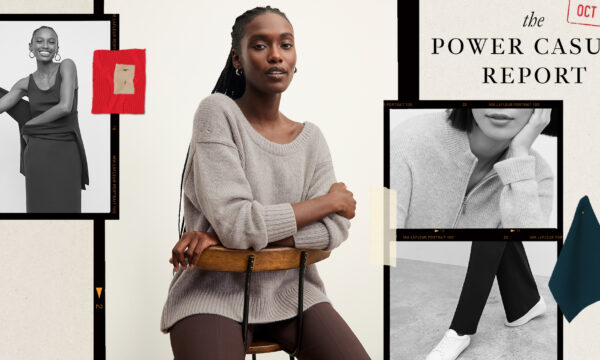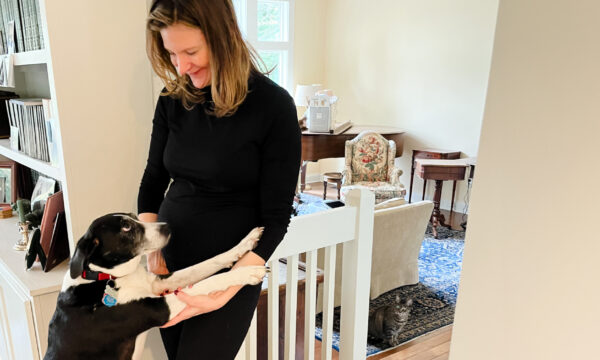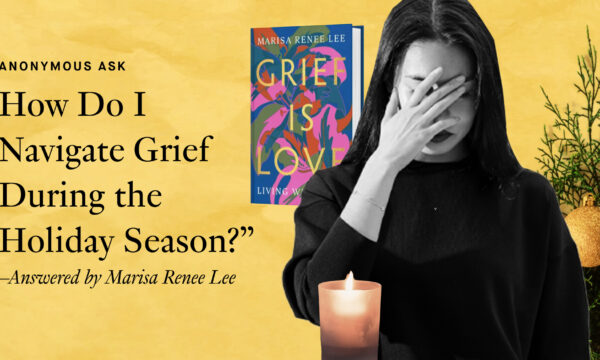
Olivia Muenter Was Known for Writing About Her Body—Here’s Why She Stopped
“I don’t want to brand my existence in the world. I’m a person who has thoughts about a lot of things, and my body just happens to be one of them.”
In the world of body positivity, Olivia Muenter is a formative figure. The New York-based writer, editor, and current co-host of the Bad on Paper podcast has amassed a wide following over the years for her honest, unfiltered essays and posts about plus-size fashion, fat-shaming, self-confidence, and more. Yet earlier this year, Muenter, 30, announced through her newsletter that she no longer wanted to write about her body, saying that doing so had gotten “exhausting” and that she was tired of feeling like she had to “justify” her appearance to readers. Explained Muenter: “I don’t want to write about my body anymore. I don’t want to think about it at all, actually. I want my body to be such a distant, insignificant detail of who I am and what I bring to the world that I wouldn’t even think of adding an ‘inspiring’ caption to a photo of me in a bathing suit.”
Now, Muenter opens up to The M Dash about her journey to becoming a body-positive influencer, how her success affected her self-image, and why she’s decided to switch gears.
Want more M Dash?
Sign up for our weekly newsletter.
Thank you!
There was a long period of my teens and my early 20s when I was really conscious of calling attention to my body in any way. I had this really deep fear that if I said, ‘I hate how I look,’ then someone would be forced to be like, ‘oh no, you look fine.’ And I’d just know that they were lying, and that, to me, was so humiliating. I also think part of it was that I just didn’t want anyone to analyze my body to the extent that I already was.
But when I was 24, a friend of mine died, and I had this moment where I was like, ‘if I’m ever really going to like myself, then I just need to be honest.’ I started writing more essays for Bustle [where I worked as a Fashion & Beauty Editor] and on my blog after that. And I learned that the more honest I was in my writing, the more I felt like I had worked through my feelings, like I could actually process them. There was something quite cathartic about writing about the worst places I had been when it came to food or body image.
Things picked up quickly. On Instagram, I would post a photo of myself in something that I felt uncomfortable in, like a bathing suit, and then the caption would be me unpacking everything it took for me to post that, which was usually a lot. Sometimes, people would respond in a way that made me feel a little strange, where they were like, ‘wow, this is so inspiring, you go girl.’ I’d wonder: Are they saying this because they’re thinking, ‘if she can do it and she looks like that, then so can I, as a thin person?’
Overall, though, posting felt really good. I felt like I had found a group of people who believed in the same things I did, who were sick of diet culture, who just wanted to take life as they were and feel okay. Many people were really encouraging, saying things like, ‘you vocalized everything that I’d been feeling.’ I could see that the essays and photos I posted were things that people related to and wanted, and so I thought, ‘this is what I’ll write about.’ Writing and posting became very easy for me. I figured that if I couldn’t get the praise and validation I wanted from being thin, then I’d get it from writing about my body.
But slowly, writing and posting started to become very dangerous for me. The feeling I would get when a post would do well or people would say it resonated with them would take over the other, negative feelings I had about my body. I thought that was fine and that I could just ignore the other stuff, but I couldn’t. Writing about my body helped me understand those feelings, but it didn’t help them go away. I realized that writing about my body to death wouldn’t lead me to some magical happy equilibrium.
I also started getting tired of people saying things like, ‘couldn’t she just lose weight instead of trying to work through all these feelings?’ It felt like I had to explain myself and how I looked, and that’s an exhausting mental weight to carry.
I got to a point this year where I was so sick of that having to be the thing that I wrote about all the time. I realized that I didn’t want to brand my body anymore. I don’t want to brand my existence in the world. I’m a person who has thoughts about a lot of things, and my body just happens to be one of them.
It’s not that I’m never going to write about my body again, but I have taken a step back. It’s taken the pressure off a little bit. There are so many other interesting things to explore and be proud of and talk about. There are other things about me that people can relate to.
I know people notice that things have changed. I’ve had followers say things like, ‘why don’t you share as much fashion content anymore?’ But for the most part, no one has really said anything. And I appreciate that.
I’m still interested in writing about that whole space. But I’ve been thinking less about my body and more about beauty standards in general and being a woman in the world. I think I’m always going to write about how I feel, and I have feelings about a lot more than just my body.










